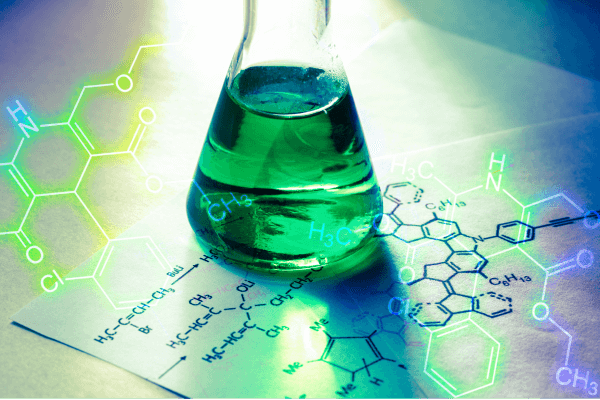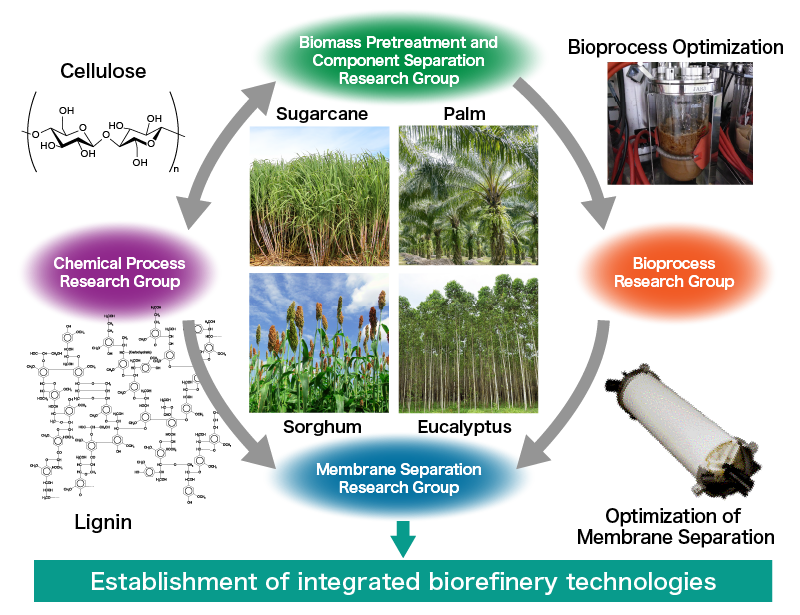Chemical and Process Research Unit
Overview

Establishment of Novel Bioprocesses Through the Integration of Chemical Processes and Bioprocesses
This research unit is working on chemical processes that optimize substance production and bioprocess optimization. For chemical processes, we are aiming at the selective conversion of high-value-added components by way of thermal/chemical conversion of biomass. For bioprocesses, we are taking dual approaches (experiments and theories) to the analysis of mixing characteristics and mass transfer—elemental technologies in chemical engineering needed for microbial fermentation.
We are also studying membrane separation technology, which is necessary to refine fermented products. Our ultimate goal is to integrate these elemental technologies to build a seamless biorefinery process.

Research Groups
Biomass Pretreatment and Component Separation Research Group
Due to its complex and rigid structure, in order to use cellulosic biomass as a material for microbial fermentation, it is necessary to liquefy it with a small amount of enzyme after physical and chemical pretreatment. This research group has developed a number of pretreatment methods, including hydrothermal treatment, alkali treatment, and ionic liquid treatment. Building on this track record, this group investigates pretreatment methods optimal for specific types of biomass and undertakes structural analysis of biomass.
Members
OGINO Chiaki (Professor), NISHINO Takashi (Professor), and TANIYA Keita (Assistant Professor)
Chemical Process Research Group
Thermo-chemical conversion technology, in addition to bioconversion technology, is being considered for the efficient use of biomass. To make the most of lignin in biomass, in particular, it is desirable to choose one from a broad spectrum beyond bioconversion. In collaboration with the Biomass Pretreatment Team, this research group aims to separate components of biomass and achieve thermal conversion for efficient use of lignin, while evaluating characteristics of the chosen biomass. One priority research topic is efficient production of bio-oil based on hydrogen reduction and other technologies. This group also aims to create new value by achieving chemical conversion of saccharides using catalysts.
Members
HAYASHI Masahiko (Professor), MORI Atsunori (Professor), NISHIYAMA Satoru (Professor), and TANIYA Keita (Assistant Professor)
Bioprocess Research Group
This research group studies processes for biologically producing useful substances from biomass-pretreated substances and how such processes can be scaled up. Biomass-pretreated substances contain lignin and fermentation inhibitors, the presence of which causes solidified fractional separation of cellulose. As a solution, this group works to develop a bioreactor with practical functions such as stirring and fermentation control. For fuel production from oils and fats by the enzymatic method, this group studies the development of efficient bioprocesses with the real biomass process in mind.
Members
OHMURA Naoto (Professor), KATSUDA Tomohisa (Associate Professor), and OGINO Chiaki (Professor)
Membrane Separation Research Group
In order to obtain end products, it is necessary to separate and refine useful substances produced in a bioreactor using a simple, low-cost process.
This research group uses Kobe University’s proprietary technology for “membrane separation” to provide innovative technologies for separating microorganisms and objective substances from culture solutions and refining them. The wealth of accumulated knowledge available to this group should allow it to develop efficient membrane separation/refinement technology for bioproduction. Its ultimate goal is to establish “integrated membrane engineering,” which makes it possible to produce customized membranes that separate and permeate target substances.
Members
NAKAGAWA Keizo (Associate Professor), KAMIO Eiji (Associate Professor), and OGINO Chiaki (Professor)
